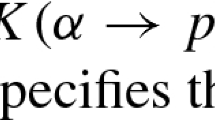Abstract
The central question of this article is how to combine counterfactual theories of knowledge with the notion of actuality. It is argued that the straightforward combination of these two elements leads to problems, viz. the problem of easy knowledge and the problem of missing knowledge. In other words, there is overgeneration of knowledge and there is undergeneration of knowledge. The combination of these problems cannot be solved by appealing to methods by which beliefs are formed. An alternative solution is put forward. The key is to rethink the closeness relation that is at the heart of counterfactual theories of knowledge.
Similar content being viewed by others
Notes
The classic source of possible world semantics for epistemic and doxastic logic is (Hintikka 1962).
This is not entirely correct: Rabinowicz and Segerberg (1994, pp. 127–128) include in the models also a set of propositions that is closed under certain operations. These sets of propositions are not relevant for our current purposes, so we will not discuss them.
References
Davies, M., & Humberstone, L. (1980). Two notions of necessity. Philosophical Studies, 38(1), 1–31.
Edgington, D. (1985). The paradox of knowability. Mind, 94(376), 557–568.
Fagin, R., & Halpern, J. Y. (1988). Belief, awareness, and limited reasoning. Artificial Intelligence, 34, 39–76.
Fara, M., & Williamson, T. (2005). Counterparts and actuality. Mind, 114(453), 1–30.
Fitch, F. B. (1963). A logical analysis of some value concepts. Journal of Symbolic Logic, 28(2), 135–142.
Hanson, W. H. (2006). Actuality, necessity, and logical truth. Philosophical Studies, 130(3), 437–459.
Heller, M. (1989). Relevant alternatives. Philosophical Studies, 55(1), 23–40.
Heller, M. (1999). Relevant alternatives and closure. Australasian Journal of Philosophy, 77(2), 196–208.
Hintikka, J. (1962). Knowledge and belief. Ithaca, NY: Cornell University Press.
Holliday, W.H. (2012a). Epistemic closure and epistemic logic I: Relevant alternatives and subjunctivism. Journal of Philosophical Logic, 44(1), 1–62.
Holliday, W.H. (2012b). Knowing what follows: Epistemic closure and epistemic logic. PhD thesis, Stanford University.
Holliday, W. H., & Perry, J. (2014). Roles, rigidity, and quantification in epistemic logic. In A. Baltag & S. Smets (Eds.), Trends in logic, outstanding contributions: Johan van Benthem on logic and information dynamics (pp. 591–629). Heidelberg: Springer.
Hughes, G. E., & Cresswell, M. J. (1996). A new introduction to modal logic. London: Routledge.
Kaplan, D. (1977). Demonstratives. In J. Almog, J. Perry, & H. Wettstein (Eds.), Themes from Kaplan (pp. 481–563). Oxford: Oxford University Press.
Kripke, S. A. (1963). Semantical analysis of modal logic I. Normal propositional calculi. Zeitschrift fur Mathematische Logik und Grundlagen der Mathematik, 9(56), 67–96.
Lackey, J. (2006). Pritchard’s epistemic luck. Philosophical Quarterly, 56(223), 284–289.
Lewis, D. (1970). Anselm and actuality. Noûs, 4(2), 175–188.
Lewis, D. K. (1973). Counterfactuals. Hoboken: Blackwell Publishers.
Luper-Foy, S. (1984). The epistemic predicament: Knowledge, nozickian tracking, and scepticism. Australasian Journal of Philosophy, 62(1), 26–49.
Nelson, M., & Zalta, E. N. (2012). A defense of contingent logical truths. Philosophical Studies, 157(1), 153–162.
Nozick, R. (1981). Philosophical explanations. Cambridge: Harvard University Press.
Pritchard, D. (2005). Epistemic luck (Vol. 29). Oxford: Clarendon Press.
Pritchard, D. (2012). Anti-luck virtue epistemology. Journal of Philosophy, 109(3), 247–279.
Rabinowicz, W., & Segerberg, K. (1994). Actual truth, possible knowledge. Topoi, 13(2), 101–115.
Sosa, E. (1999). How must knowledge be modally related to what is known? Philosophical Topics, 26(1/2), 373–384.
Williamson, T. (2000). Knowledge and its limits. Oxford: Oxford University Press.
Zalta, E. N. (1988). Logical and analytic truths that are not necessary. Journal of Philosophy, 85(2), 57–74.
Acknowledgments
Research for this paper has been funded by the Research Fund KU Leuven. Early versions of this paper have been presented on the Workshop on Knowledge and Language (KU Leuven, 29 April 2014) and on the European Epistemology Network Meeting (Autonomous University of Madrid, 30 June–2 July 2014). I would like to thank the audiences on both occasions for helpful feedback. In addition, I would like to thank the members of the Leuven Epistemology Group for their much appreciated comments. Finally, I would like to thank the anonymous reviewer for his or her extremely detailed and useful reports.
Author information
Authors and Affiliations
Corresponding author
Rights and permissions
About this article
Cite this article
Heylen, J. Counterfactual theories of knowledge and the notion of actuality. Philos Stud 173, 1647–1673 (2016). https://doi.org/10.1007/s11098-015-0573-3
Published:
Issue Date:
DOI: https://doi.org/10.1007/s11098-015-0573-3




